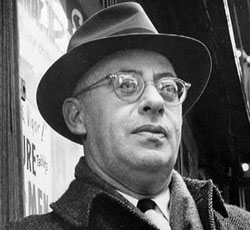
"A Night with Saul" at Wellington Chapter on March 4
Invites you to attend its monthly meeting
on Wednesday March 4
featuring:
presented by
Americans for Prosperity Foundation Grassroots Leadership Academy
Program 6:30pm, Doors open at 6:00pm
Hurricane Grill and Wings
4075 State Road 7
Wellington, FL 33449
(NW corner of Lake Worth Road and 441)
Please click on the RSVP button above so we are prepared to accommodate you.

Saul Alinsky (1909 – 1972) was a liberal community organizer in Chicago who developed a method of local organizing that was widely copied by Democrats, and influenced Barack Obama and Hillary Clinton. He is credited with coining the term “community organizer.” His most well-known accomplishment was the book Rules for Radicals. He wanted reform inside the system by pressuring government officials to take into account the needs and wants of neighborhood residents. He was opposed by far-left radicals who wanted to destroy capitalism and who feared that Alinsky was strengthening it by resolving the issues most important to the poor.
He was awarded a doctorate in archaeology from the University of Chicago and was awarded a fellowship in sociology, which he never completed. He was nicknamed “The Red” for his radicalism –his book was dedicated tongue-in-cheek to Lucifer, the first radical. [1]
Alinsky’s approach to community organizing stressed “self interest as the generating reality of life.” This view arose from his experiences in the Congress of Industrial Organizations (CIO) as an organizer in the style of labor union leaders Samuel Gompers and John L. Lewis. Alinsky produced notable results like the Back of the Yard and the Woodlawn organizations in Chicago. Alinsky and his Industrial Areas Foundation utilized confrontational tactics and dramatic protests to help members gain bargaining status and a larger share of the local pie. He disavowed with increasing vigor any national issue strategy or ideological outlook. The weakness of his emphasis on the organizer as a tactician only and the granting of control to those organized was that racist goals could be chosen by the membership as a whole.
Source: Conservapedia
